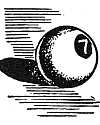|
To the infant photographic industry celluloid opened up an entirely new field and the roll film was born. A little later, because of this same quality of flexibility, it made the motion picture industry possible and, as another outgrowth, symphonic music and the voices of the world's great artists could be recorded on flexible discs or records. Eventually, cellulose, that is the basis of celluloid, found its way into lacquers, solving the problem of automobile finishing, and cutting the time from days to hours.  I
don't believe Hyatt ever collected the ten thousand dollar prize. But
he kept right on after the billiard ball and many, many years later, as
the result of the joint efforts of Hyatt, Doctor Baekeland and the
Bliss Company, a successful billiard ball was made. I have some of them
in a case in my home in Dayton. I
don't believe Hyatt ever collected the ten thousand dollar prize. But
he kept right on after the billiard ball and many, many years later, as
the result of the joint efforts of Hyatt, Doctor Baekeland and the
Bliss Company, a successful billiard ball was made. I have some of them
in a case in my home in Dayton.In the wake of his search for the billiard balls, Hyatt left at least four new industries - employing thousands of people: the bearing industry, the celluloid industry, the photographic business and motion pictures. But each one of these industries is a story in itself. To me the work of Hyatt with celluloid is important because it is an example of a man who made an outstanding development with a minimum of laboratory equipment, but with a large amount of intelligent curiosity and acute powers of observation - two of the most important requirements in a search for any new thing. |








